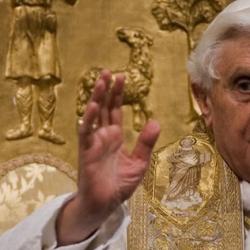Christopher Carroll reviews two volumes of music criticism written by Virgil Thomson at the NYRB. Carroll characterizes Thomson as a “knight errant” because of principles like this one, enunciated in his book, The State of Music:
To expose the philanthropic persons in control of our musical institutions for the amateurs they are, to reveal the manipulators of our musical distribution for the culturally retarded profit makers that indeed they are, and to support with all the power of my praise every artist, composer, group, or impresario whose relation to music was straightforward, by which I mean based only on music and the sound it makes.
He meant it, even when it involved taking icons to task. In one review, Thomson wrote, “Toscanini’s conducting style . . . is disembodied music and disembodied theater. It opens few vistas to the understanding of men and epochs; it produces a temporary, but intense, condition of purely auditory excitement. The Maestro is a man of music, nothing else. Being also a man of (in his formative years) predominantly theatrical experience, he reads all music in terms of its possible audience effect. . . . He quite shamelessly whips up the tempo and sacrifices clarity and ignores a basic rhythm, just making the music, like his baton, go round and round, if he finds his audience’s attention tending to waver. No piece has to mean anything specific; every piece has to provoke from its hearers a spontaneous vote of acceptance. This is what I call the ‘wow technique.’”
But the Thomson that emerges from Carroll’s review has another side, self-serving, petty, self-promoting. He wrote reviews of his own music, or sent a stringer to do the review. He fell out with John Cage because Cage was less than enthusiastic about Thomson’s music. Carroll writes, “He routinely slept through performances he was reviewing, had a penchant for making sweeping and sometimes perplexing generalizations, and dismissed beloved works and composers with little explanation, which made him seem at times like a dyspeptic, irascible crank.”
Not what one could call an entirely chivalric critic.













